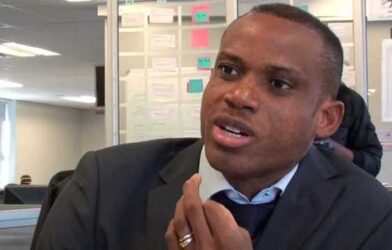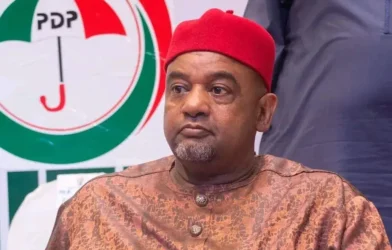The name Justice Emmanuel Ogwuegbu to researchers of modern Nigerian law history, remains respectable, credible and a man of high integrity, and he is among a few of the old breed of Nigerian Judges, who by dint of hard work rose from the lowest rung of the Bench to the apex court; and the law books are replete with his legal pronouncements, which have contributed in no small measure to the development of law in Nigeria.
As friends and families join the quintessential jurist to rejoice on the occasion of his 90th birthday, and at a point when the Nigerian judiciary is facing its worst turbulence in history occasioned by the many negative ways the citizens look at an institution that is supposed to be the citadel of justice, it has become necessary for this eminent retired jurist’s credentials to be laid bare as a reference for how things ought to be.
Justice Emmanuel Obioma Ogwuegbu is a retired justice of the Nigerian Supreme Court, who started as a magistrate, rose steadily through the ranks – the High Courts and then to the Supreme Court and left gigantic footprints that would surely remain indelible in the sands of time. His invaluable and outstanding contributions to the apex court and, in fact, Nigerian jurisprudence in general.
Described by many including his colleagues at the Bench as humble, simple, unassuming, resilient, and deeply religious, Justice Ogwuegbu who bowed out of the supreme court gracefully o Friday, March 16, 2003, when he attained the statutory age of 70 was one of the notable dispensers of justice in the Nigerian Bench.
Very assiduous, focused, and resilient, Justice Ogwuegbu worked tirelessly behind the scene to enthrone justice in the highest court of the land. When he is not delivering the lead judgment, he is concurring or dissenting.
A seasoned jurist and a compassionate church leader, Justice Ogwuegbu, perharps, demonstrated his passion and patriotism in his lead judgment delivered on May 29, 1998, in a celebrated criminal case between Sunday Effiong (appellant) and the State (respondent), Justice Ogwuegbu showed the stuff he made up of.
The appellant (Effiong) was on September 27, 1983, convicted at the High Court of Borno State Holden at Bama and sentenced to death by hanging under Section 221(b) of the Penal Code for causing the death of Police Constable Isaac Onoh on or about June 23, 1982, at Tandari Ward, Bama, by stabbing the said Isaac Onoh on the stomach with the knowledge that death would be the probable consequence of his act. (See Onafowokan v. The State, supra)
Another notable judgment by the veteran retired jurist was his agreement with a seven-man panel of justices on Friday, April 5, 2002, in a case between the Attorney General of the Federation and the Attorney General of Abia State and 35 others over the derivation palaver, wherein he concurred with the decision of the lead judgment that the Federal Government should calculate the derivation based on the low water mark.
It was a dispute between the Federal Government, on the one hand, and the eight littoral states of Akwa Ibom, Bayelsa, Cross River, Delta, Lagos, Ogun, Ondo, and Rivers on the other hand as to the southern (or seaward) boundary of each of these states
Again, on the controversy over the decision of the National Assembly to enact laws to regulate the tenure of local councils, Justice Ogwuegbu was also in the panel that gave the landmark judgment. In that case, the Supreme Court declared that no law enacted by the National Assembly could validly increase or otherwise alter the tenure of office of elected officers or chairmen and councilors of local councils in Nigeria except for the Federal Capital Territory (FCT) alone. It also held that the National Assembly has no power except about the FCT alone to make any law concerning the following matters or any of them, to wit.
Undoubtedly, the legal luminary worked hard to earn his respected position in the judiciary, the country, and beyond it, upholding standards of clarity and balance in judgments for many years, and consistently sharing his wisdom with leaders.
The country needs to thank this nonagenarian for believing so much in Nigeria that he returned to the country to start his private legal practice in 1963, after studying at the University of Liverpool and the University of London as his achievements could be pinned down to good education.
Hardworking and innovative, after graduating from college, he traveled to England for his tertiary education. Ogwuegbu enrolled at the University of Liverpool, England in 1957 and left in 1960 with an LL.B degree in law. He also attended the University of London, for B.L. Middle Temple between 1960 and 1962 and also bagged an LL.M Master in Law degree. He was called to the Bar of the Honourable Society of the Middle Temple in November 1961 and enrolled in the Supreme Court of Nigeria in October 1962 as a barrister and solicitor.
Before his travel to England for further studies, Justice Ogwuegbu worked as a clerk in the then-Okigwe Native Authority from 1953 to 1956. When he returned to Nigeria after graduation in 1962, he went into private legal practice, which began in 1962 and lasted until 1965 when he was appointed Magistrate Grade 1.
He was later promoted to a senior magistrate in 1969. Thereafter, he was seconded to the Ministry of Justice, East-Central State of Nigeria as Secretary to the Law Revision, Law Reform, and Law Reporting Division of the Ministry of Justice. In that capacity, he edited Vol. X of the Eastern Law Reports and Vol. 1 of the East Central State Law Report in 1970. In 1971, he resigned and resumed private legal practice.
Years later, the Imo State government could no longer bear the absence of Justice Ogwuegbu on the Bench and promptly appointed him judge of the High Court of Imo State in 1976. He was assigned to Owerri and Aba Judicial Divisions between 1976 and 1987 as an administrative judge in both divisions.
In 1987, he was elevated to the Court of Appeal of Nigeria. After spending only five years at the Appeal Court, his industry as a judge caught the attention of the authorities and he was subsequently elevated to a justice of the Supreme Court of Nigeria in February 1992. He was appointed justice of the Supreme Court of The Gambia in December 1999.
Eminent personalities within and outside the country have paid glowing tribute to his erudity and versatility in the judicial circle. Prominent among them is President Muhammadu Buhari who prayed for continued good health and sound mind for the quintessential retired jurist.
In a State House Press Release, the President hailed the former Justice of the Supreme Court; Emmanuel Obiomma Ogwuegbu, celebrating God’s grace of a worthy long life of service, with many achievements, especially in the judiciary.
By and large, Justice Ogwuegbu who has been vouched to be a well-known, respected, and beloved jurist, represents the essence of the perfect jurist, always smart, gentle, and with goodwill, to build bridges between ‘judgement and justice’.
*EMMANUEL ONWUBIKO is head of the HUMAN RIGHTS WRITERS ASSOCIATION OF NIGERIA and was NATIONAL COMMISSIONER OF THE NATIONAL HUMAN RIGHTS COMMISSION OF NIGERIA.












Comments are closed